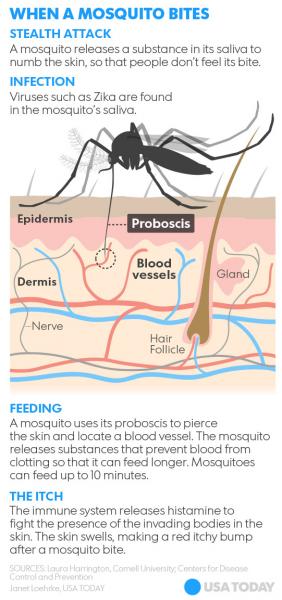You are here
Company calls on FDA to issue permit for genetically modified mosquitoes
Primary tabs

A company with a swarm of genetically modified mosquitoes wants the Food and Drug Administrationto grant emergency approval for the controversial insects' use in the fight against the Zika virus.
Oxitec changed the DNA of the Aedes aegypti mosquitoes that spread the virus so their offspring die before adulthood, Hadyn Parry, the British company's CEO, told the House of Representatives' Committee on Science, Space, and Technology in Washington on Wednesday. The company deploys only male mosquitoes, which cannot bite, to halt transmission of the disease, he added.
"I don’t think time is on our side with Zika," Parry said.
Scientists have detected Zika in 39 countries and territories in the Caribbean and Latin America, according to the Pan American Health Organization. Zika hit the U.S. territory of Puerto Rico particularly hard, striking more than 800 people. The virus, which can cause devastating birth defects, could spread locally in the United States in the coming weeks and months.
In Puerto Rico, "we could have a catastrophe on our hands if we are not careful," Parry said.
Oxitec conducted field trials in Brazil, the Cayman Islands, Panama and Malaysia and found the genetically altered insects reduced the number of Aedes aegypti mosquitoes by 90%, Parry said.
Some U.S. residents worry that releasing the mosquitoes could have unintended and unpredictable consequences on the environment because they have never been released into the wild on such a large scale.
The FDA examined that issue and found no significant impact. The agency, which has not yet approved the insects, is reviewing public comments on the topic before making a final decision. Parry said an emergency authorization would allow the mosquitoes to be deployed more quickly.

"Controlling the mosquitoes is our first line of defense, and it's an area we’ve neglected over the past decades," Parry said. "Current insecticidal products are just not efficient to control this mosquito in the urban environment."
The Florida Keys wants to conduct a trial with the genetically modified mosquitoes, partially because it has suffered recent outbreaks of a mosquito-borne disease called dengue that's also transmitted by Aedes aegypti. Given its climate and busy international airports, Florida is at higher risk than other states to see local cases of Zika. All of the more than 540 Zika cases diagnosed so far in the continental U.S. are travel-related.
Peter Hotez, dean of the National School of Tropical Medicine at Baylor College of Medicine in Houston, said questions remain about the altered bugs. Oxitec hasn't yet shown that the mosquitoes reduce rates of diseases such as Zika. And tests of insects were relatively small, meaning there's no way to know whether the technology will be effective on a large scale, he added.
Deploying large numbers of the insects could be too expensive for the developing countries with outbreaks of the virus, said Grayson Brown, a professor of entomology at the University of Kentucky. Even communities in the U.S. with small mosquito-control budgets likely can't afford the modified mosquitoes, he added.
In Brazil, Oxitec's mosquitoes cost about $10 a person per year, Parry said. Brazil, a country of 200 million people, now spends an average of about $5 a person annually to control the Aedes aegypti. While some parts of that country spend little on mosquito control, areas with dense mosquito populations and high dengue rates spend $20 to $40 a person, Parry said.



Recent Comments